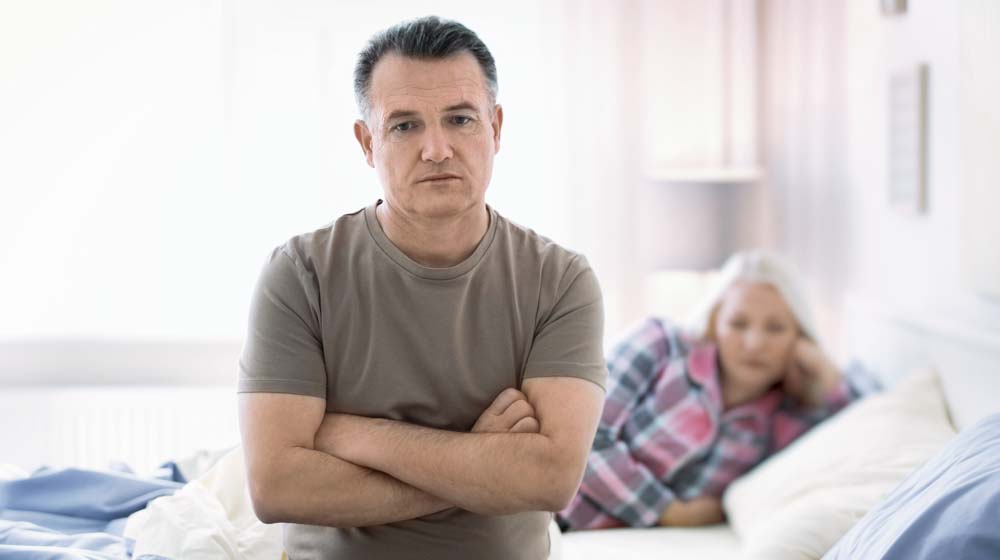
Health


Men's sexual health is influenced by sex hormones. Contrary to popular belief, this includes both testosterone (T) and estrogen, even though the latter is known as the “female sex hormone.” As you age, testosterone levels naturally decline. This can lead to reduced sex drive, fatigue, erectile dysfunction (ED), and loss of lean muscle mass.
If clinically indicated, the go-to treatment for male hypogonadism (low T) is testosterone replacement therapy (TRT). However, TRT may be contraindicated in certain cases. This is why some healthcare professionals turn to alternative (off-label) treatments such as clomiphene (Clomid) and less frequently, anastrozole (Arimidex).
Anastrozole is a prescription medication that belongs to a class of drugs called “nonsteroidal aromatase inhibitors.” It works by blocking the enzyme aromatase, which is responsible for converting testosterone into estrogen, particularly its most potent form—estradiol. Although the net result is lower estrogen levels, this does not necessarily translate into higher testosterone. The relationship between testosterone and estrogen is a little more complicated than that.
So, what is anastrozole used for? Healthcare professionals typically prescribe anastrozole and other aromatase inhibitors to women with breast cancer. The drug is approved by the Food and Drug Administration (FDA) for the treatment of hormone-receptive breast cancer in postmenopausal women.1
You may have heard that anastrozole is sometimes prescribed to men with low testosterone, particularly in cases where estrogen levels are high. However, this is an off-label use, which means it has not been approved by regulatory agencies.
You may be wondering, why consider an alternative to TRT? Despite its efficacy, this first-line treatment can sometimes be contraindicated or have adverse effects that limit its use. One such effect is the suppression of sperm production (spermatogenesis), which can harm reproductive function. This side effect may limit the use of testosterone in younger men who wish to maintain fertility. To circumvent these issues, healthcare professionals may prescribe off-label medications that work differently from TRT.
Studies report conflicting results about the efficacy of anastrozole for male hypogonadism (low T) and low fertility. Some studies have found that the drug significantly reduces estradiol levels, leading to increased follicle-stimulating hormone (FSH) production and in some cases, increased T concentration.2,3
Yet, some researchers point out that despite the effect on sex hormone concentrations, actual clinical improvements are often lacking. Indicators such as metabolic and psychological health, insulin sensitivity, body composition, and exercise capacity do not always show significant improvement.4,5
Anastrozole, like other aromatase inhibitors, blocks the enzyme aromatase. This enzyme is present in both men and women and is necessary for the conversion of testosterone into estrogen.
Lowering estrogen levels in men can sometimes result in higher testosterone. This is because estrogen and testosterone are part of a hormonal balance, and reducing estrogen can decrease the feedback inhibition on the hypothalamus and pituitary gland. This can lead to an increase in hormones such as follicle stimulating hormone (FSH), luteinizing hormone (LH), and subsequently testosterone.
However, the relationship between estrogen and testosterone is complex. While some estrogen blockers can increase testosterone levels by limiting the amount of estrogen present or active in the body, this doesn't always translate into significant clinical benefits. It's important to approach this under medical supervision, as both hormones play crucial roles in overall health and well-being
The potential therapeutic benefits of anastrozole include delaying puberty in boys with precocious puberty and assisting men whose testosterone (T) levels have decreased due to aging or obesity.1 However, these benefits come with potential costs, particularly when used to boost testosterone. In the next section, we’ll explore the side effects of anastrozole.
How serious are anastrozole side effects for men? This is not entirely clear, as much of the available data comes from women with breast cancer. The most common side effects include:
In rare cases, patients may develop the following side effects:
Joint problems caused by aromatase inhibitors are often the reason for stopping treatment. These issues arise from reduced bone mineral density caused by prolonged low estrogen levels. Joint problems typically begin as pain and swelling.1
Having your estrogen levels drop too low can also affect sexual function and cause ED. Although evidence linking anastrozole to ED is limited, maintaining healthy levels of sex hormones is crucial during hormone treatment.
It's easy to miss the bigger picture when relying solely on medication to address low testosterone levels. Changing your everyday habits can make a significant difference and lead to more lasting results.
Opt Health physicians have helped countless men balance their sex hormones. We go beyond anastrozole or any other single drug. Our strategy involves taking an in-depth look at your health condition, understanding the underlying causes, and developing a comprehensive treatment plan. We believe the best approach combines lifestyle interventions with effective treatments.
While anastrozole may seem like a quick fix for symptoms associated with low T levels, consider whether you want fast or lasting solutions. Remember that treating hypogonadism (low T) with aromatase inhibitors is not FDA-approved and comes with serious side effects, such as bone loss.
There may be better ways to manage your low T, such as undergoing a detailed health evaluation with a trusted healthcare provider. At Opt Health, we’ll ask ourselves, what is the underlying cause of this patient’s low T? Regular exercise, quality sleep, and a healthy diet might do wonders to improve your hormonal balance. With a personalized care plan that addresses your overall health, you can regain your energy, vigor, and stamina for years to come.
1. Peters A, Tadi P. Aromatase Inhibitors. In: StatPearls. StatPearls Publishing; 2024. Accessed August 14, 2024. http://www.ncbi.nlm.nih.gov/books/NBK557856/
2. Clinical application of aromatase inhibitors to treat male infertility | Human Reproduction Update | Oxford Academic. Accessed August 15, 2024. https://academic.oup.com/humupd/article/28/1/30/6453856
3. Yang Y, Chen S, Chen H, Guo Y, Teng X. The efficacy of anastrozole in subfertile men with and without abnormal testosterone to estradiol ratios. Transl Androl Urol. 2022;11(9):1262-1270. doi:10.21037/tau-22-95
4. DiGiorgio L, Sadeghi-Nejad H. Off label therapies for testosterone replacement. Transl Androl Urol. 2016;5(6):844. doi:10.21037/tau.2016.08.15
5. Awouters M, Vanderschueren D, Antonio L. Aromatase inhibitors and selective estrogen receptor modulators: Unconventional therapies for functional hypogonadism? Andrology. 2020;8(6):1590-1597. doi:10.1111/andr.12725
Your health, your terms. Discover how personalized care can transform not just the way you feel, but how you live.